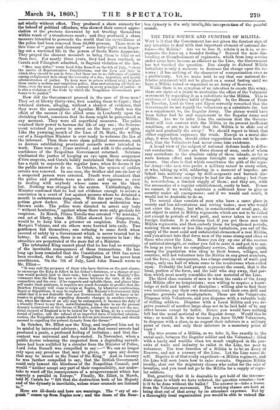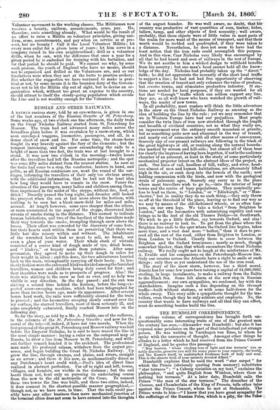THE TRUE SOURCE AND FUNCTION OF MILITIA. WITY is it
that the Government has not given the faintest sign of any intention to deal with that important element of national de- fence—the Militia ? Are we to lose it, retain it as it is, or re- organize the force on a sounder footing ? Beyond the mere dis- banding or disembodiment of regiments, which from long service under arms have become as efficient as the Line, the Government has not touched the question. But simply to disband Militia battalions is only a measure to decrease the charge upon the re- venue ; it has nothing of the character of reorganization even as a preliminary. Yet we make bold to say that our national de- fensive armament will not be placed on a sound footing until we have a Militia raised or organized as an Army of Reserve.
While there is no symptom of an intention to create this army, there are signs of a desire to neutralize the effect of the Volunteer movement by regarding it as a substitute for the Militia. This is evidence of a mistaken habit of thought. In the House of Peers on Tuesday, Lord de Grey and Ripon correctly remarked that the Government do not regard the volunteers as a substitute for, but as a supplement to, the Regular Army. The phrase would have been better had he said supplement to the Regular Army and Militia. Are we to infer from the omission that the Govern- ment will rest content with the Militia in its present inefficient condition, or are we to infer that the Militia is to slide out of sight and gradually die away ? We should regret to think that either supposition expresses the truth. Except as a moral dis- play, it were better, should either supposition turn out to be cor- rect, that the Volunteers had never come into existence.
A broad view of the subject of national defence leads to differ- ent conclusions. There are three classes of men, each of whom may contribute to the absolute safety of these islands, as far as mere human effort and human foresight can make anything secure. One class is that which constitutes the pith of the regu- lar Army—the men who prefer a military career to every other, or who, taking up with soldiering in a moment of impulse, are licked into military shape by drill-sergeants and barrack dis- cipline. These men can always be had for the asking ; but there is, nevertheless, a limited supply of them ; and they are, with the accessories of a regular establishment, costly to boot. Hence we cannot, if we would, maintain a sufficient force to give us security under all emergencies ; and if we would and could, it would not be desirable to do so.
The second class consists of men who have a surer place in society and less adventurous and roving tastes ; men who would not enter the Army, but who, in consideration of small pay, do not object to enlist in Militia regiments which are not to be called out except in periods of real peril, and never taken to serve on foreign stations. It is obvious that if you get these men into Militia regiments, and then embody them for lengthened periods, making them more or less like regular battalions, you out off the supply of the most solid and substantial elements of a real Militia, and you attract into that force men of the same stamp and class as those who enter the Line. Hence you dry up one of the sources of national strength, or rather you fail to seize it and put it to use. So long as you have no compulsory service, the soldierly spirits among the population who cling to their homes, villages, and counties, will not volunteer into the Militia in any great numbers, and the force, in consequence, has a large contingent of waifs and strays, only one half of whom come to the rendezvous when called upon. Probably the half present represent the sound, that is the local, portion of the force, and the half who stay away, that por- tion which most nearly resembles the raw material of the Line.
The third class consists of men to whom the ranks of the Army and Militia offer no temptations ; men willing to acquire a know- ledge of drill and habits of discipline ; willing also to find their own uniforms, pay their own instructors, rent their own drill and practice grounds and headquarters. These are the Volunteers. Dispense with Volunteers, and you dispense with a valuable body of willing soldiers. Dispense with a Local Militia and you de- prive yourself of another large class not to be laid hold of by any other means except by ballot. Hence you would have nothing left but the usual material of the Regular Army. Would this be wise ; or would it be wise because you have 70,000 Volunteers, to dispense with a class, in no respect their inferiors in a military point of view, and only their inferiors in a monetary point of view ?
The true source of a Militia, as we take it, lies exactly in the social scale between the Regular soldier and the Volunteer ; filled with a hardy and warlike class too much employed in the pur- suits of trade and industry to enlist in the Line, too poor to volunteer. The tree function of a Militia is to be an Army of Reserve, and not a nursery of the Line. Let the Line nurse it- self. Deprive it of that ready expedient—a Militia regiment, and the Line will soon learn how to raise recruits. Organize Militia locally, shut .out the migratory classes who enlist for the sake of bounties, and you need not go to the Militia for a supply of regu- lar soldiers.
But, granting that it is desirable to get hold of the.interme- diate class to which we have referred, the question remains—how
is it to be done without the ballot? The answer is—take a lesson from the Volunteer movement The working classes are hurt at being shut out of that array by its attendant expenses. But by a thoroughly local organization you would be able to extend the
Volunteer movement to the working classes. The Militiaman now receives a bounty, uniform, accoutrements, arms, pay. He, therefore, costs something already. What would be the result of an effort to raise a Militia on volunteer principles, giving uni- form, arms, accoutrements, and pay when on service as at pre- sent, but no bounty ? (Jail it the Local Volunteer Militia; let every man enlist for a given term of years ; let him serve in a company raised in his own neighbourhood ; drill as a volunteer drills, when he can, with the difference that once a year for a given period he is embodied for training with his battalion, and for that period he should be paid. We cannot see why, by some such process, the youth of England who have no means, should not be organized and drilled as the Volunteers are, and as our forefathers were when they met at the butts to practise archery. But whether the suggestion we have ventured to make is prac- tical or not, by some means it is the bounden duty of the Govern- ment not to let the Militia slip out of sight, but to devise an or- ganization which, without too great an expense to the country, should attract to itself the steady-going population which avoids the Line and is not wealthy enough for the Volunteers.



























 Previous page
Previous page